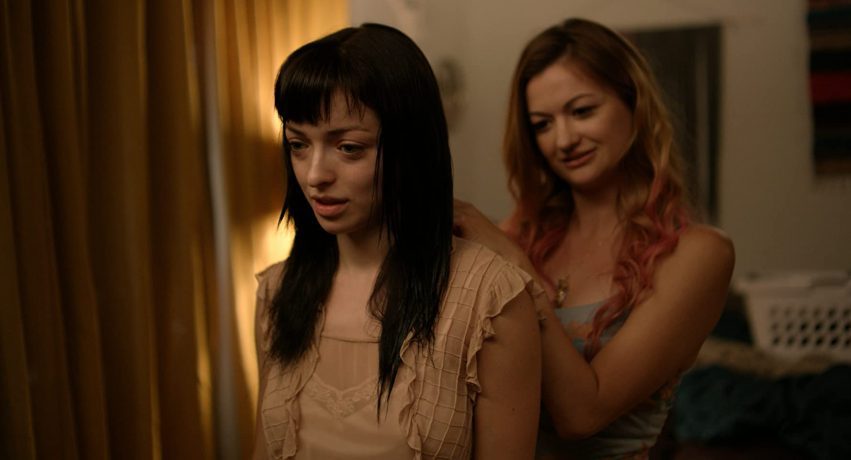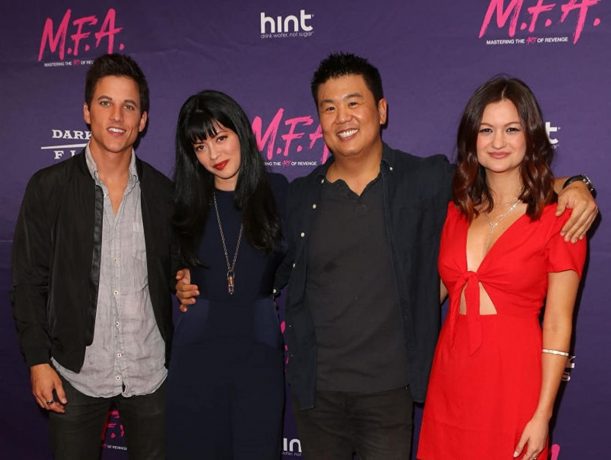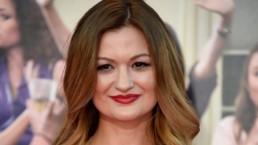Leah McKendrick: “I don’t get in my own way”
"I don't get in my own way."
In her Instagram bio, Leah McKendrick describes herself as an “Actress ???????????? Moviemaker ???? Brunch lover ???? Horror buff ????”
Getting through the emotionally dark times as the writer, producer, and actress was physically draining.
As a producer, getting the “shit beat out of you” is part of the job.
It can be tough. As a writer, I feel emotional and thoughtful, and sensitive. Similar to being an actor. To me, these roles go hand in hand.
As a producer, you’ve gotta lead with a calm, level-head. It’s two parts of yourself battling. The biggest jump for me is from actor to producer. My other producers knew that on my big acting days they needed to hold down the fort. They let me have that space. But I would still freak out about things. Especially on a tiny indie film like M.F.A. – my mentor and friend JB (John Benitz, my mentor and close friend and consulting producer on M.F.A.) told me this- as a producer, it’s your job to get the shit beat out of you every day. Yep. Something gets broken, it doesn’t matter who did it- you step up and apologize profusely and fix it. Someone’s not happy, you work it out so that they are. Cops show up- you go out there and beg and plead. As an actor, it can be freeing to let your emotions lead you. To follow impulses. That is not a strength as a producer! I don’t know that it gets easier from project to project to wear all the hats, but I have a better understanding of what is required of me, and where I draw the line. I’m learning. I can’t do it all. Delegating can be hard for me, and I’m figuring it out. You gotta suffer for your first one sometimes! And believe me – I did. On the next one, I won’t be boots on the ground as much as I had to be on M.F.A. On the next one I will hand over more of my producing duties. I say that now, but we shall see!

Gaining confidence as an artist and a woman at Chapman University.
Chapman is, in many ways, responsible for me becoming a filmmaker. I never really wanted to go to college. I just wanted to go to Hollywood and be a pop star and an actress. At Chapman I began writing plays and scripts, directing, producing, starring in things I’d written… I was very experimental. I wasn’t afraid of failing because there was this very safe space where it was encouraged to take risks. My professors always praised the qualities I never knew I had. Michael Nehring always told me I’d make a great director from the notes I gave other actors in class. Directing had never even occurred to me. JB was the one who got me screenwriting. When I wanted to double minor in Women’s Studies and Sociology the school let me build my own minor. Barney McGrane, my sociology professor was always so encouraging. He made me feel that my thoughts were valid and intelligent. It sounds simple, but looking back, I think it gave me a lot of confidence, not only as an artist but as a woman. It’s interesting that I write very feminist, female-driven work and many of the biggest champions in my life and career have been men. I love men! If you look deeper, you see that in my films, too.
M.F.A. was called too risky or too feminist or too man-hating in pitch meetings.
Making M.F.A. was easily the most difficult experience of my life. Many of the challenges were typical of any indie film: never enough money or time. Everything that can possibly go wrong always goes wrong!
But for me personally, the greatest challenge was how much the film evolved from my original vision – and that’s not necessarily a bad thing. But a film begins as this very intimate, very solitary experience. It was a concept, then it was me getting up early every morning to go to the coffee shop as though I was going to a day job. I felt that I needed to take it seriously or no one would ever take me seriously. I chipped away at it, for many months and then I sat in meetings where people would tell me it was too risky or too feminist or too man-hating or blah blah -whatever. You write hundreds of emails begging people to believe in nothing but you and a PDF. There are a lot of steps that you fight tooth and nail through. And what you have to hold on to is the vision in your head. The love that you have for that vision. So when it starts to come to fruition and that vision starts to change, it can be really hard. When things get thrown out or aren’t working or get cut- MAN. It can feel like a part of you is dying! And I wish I had been more prepared for that. I wish I could have been less precious about it all because it would have saved me a lot of heartaches. But I think it’s just something you go through on your first feature. And I love our film. It’s not exactly the film I originally envisioned- and that’s ok. Film is a collaboration of many artists. That’s what makes it great.

Greenlight your own script.
I would say don’t wait for permission. And don’t use a lack of resources as an excuse. Start small. Write it. Make stuff with friends. Collaborate. But just be constantly creating and developing your voice and your sense of taste. I’d say the biggest killer of creativity is getting in your own way. A strength that I have is that I am hungry and foolish. I always assume something is going to be easier than it is and it’s always a rude awakening and I’m crying in the shower. But I don’t get in my own way. I don’t always succeed, but I make a lot of attempts. All of the attempts have made me braver and smarter. I love the filmmakers out there shooting a short or sketch a week or making a feature for 20 grand. That’s inspiring. They’re not waiting for anyone’s permission and that’s how you have to do it. Too many people are waiting for someone to greenlight their million-dollar script. Greenlight your own script. If you don’t have a million, rewrite it so you can make it for less. I’ve learned that you’ve gotta give yourself the opportunity before anyone else will. But if you build it, they will come.
Rebekah Roberts
Rebekah Roberts was born and raised in a sleepy Arkansas town surrounded by miles and miles of cotton. Her interest in the arts began at a very young age. Rebekah escaped to California at age 16. She went on to earn a BA in Theatre at Chapman University. When she is not acting, Rebekah enjoys long walks to the bank, Netflix binging, and obsessing over Dolly Parton or Beyonce.

